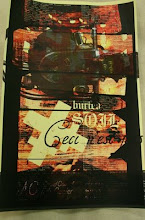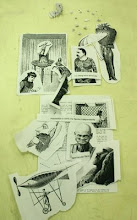June Thomas: One thing that really struck me though, Mason--I love the book, by the way--is that unless you're already successful and so you've got the money, or maybe just the kind of the command, to say, "Family, Life, work around me" ... you either have to be a kind of a monomaniac, or a bully, or just a kind of commanding presence to make everyone accommodate your preferences, because mostly they're not really needs; they're just, preferences. Does that strike a chord with you?A few days ago an Onion-like headline came to me: "Loser Artist Loves his Family". (Alas, I looked to see if The Onion takes editorial submissions, and they do not.)
Mason Currey: Yeah, I think so. I mean, these people were--you know, they knew what they wanted and they were willing to ... make other people adjust their schedules to fit them, a lot of them, anyway. There are a lot of forceful personalities in the book, and maybe it's a little discouraging for the 'meeker' creative people among us.
Dana Stevens: Yeah, it made you envy people like Freud, or Thomas Mann, ... who had whole families and households that kept quiet for hours so they could work, and brought them--somebody had coffee brought to them in bed every morning... Or who was it who had a glass of cold water every morning in bed? That was a great ritual.
Mason Currey: That was, that was Flaubert...
Dana Stevens: Right. Flaubert's household definitely revolved around him.
Mason Currey: Yeah, they would all stay quiet until he woke up, and then he would get his pipe and newspapers and his mail, and his water, and everything.
Dana Stevens: That sounded so good. I want Flaubert's morning.
Stephen Metcalf: I know, but what's so amazing about this, right, is that we've placed this incredibly finely graded filter over all of humanity in order to get this book, right?, which is that these are the people who are justified, retrospectively, for having made these demands: Flaubert, Freud, Thomas Mann, on and on and on. But think about all the douchebags out there, who've forced everyone to revolve around their egocentric belief in their own artistic destiny, who have no artistic destiny. So, this book could be dangerous fodder for some people.
Anyway, Dr. Duquette would be happy to know that, according to the interview excerpted above, Jane Austen was a responsible, well-balanced woman.















































































No comments:
Post a Comment